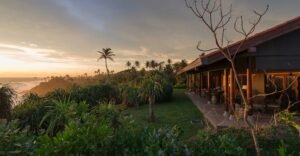
Powerful Political Team to Stabilize Sri Lanka’s Economy
News Today: Ranil Wickremesinghe’s Plan to Assemble a Multi-Party Team
President Ranil Wickremesinghe asserted his ability to stabilise Sri Lanka’s economy over the past two years by assembling a team of the most talented individuals from across various political parties.
Speaking at a meeting with legal professionals,the President emphasised that no other political group can surpass the economic team he has built, which transcends party lines.
During the event, organised under the theme ‘Lawyers for Economic Stability’, President Wickremesinghe highlighted that the current political contest is not merely about leadership, but about ensuring the survival and well-being of the people. As the person who brought the people who urged voters to cast their ballots in favour of moving beyond the days of struggling to find basic necessities like gas cylinders, signalling a need to focus on long-term economic recovery.
Addressing the gathering, which included senior Presidents’ Counsels, President’s Counsels, and other legal professionals, the President also responded to criticisms regarding the handling of corruption cases. He recalled how, under the Good Governance Government in 2015, the JVP took charge of pursuing corrupt individuals but appointed Ananda Wijepala, who was neither a Police officer nor a lawyer, to lead the effort. He mentioned that the initiative relied on 400 files and that his role as Prime Minister at the time was limited to providing financial resources.
“First of all, I would like to thank you all for being here today. We have gathered for a common purpose – to protect and advance the country together.
“President J.R. Jayewardene once told me not to leave a vacuum in power. That’s why I stepped up and took on the role of Prime Minister. The situation at that time was dire, and it’s needless to say what could have happened if the country had continued on that path. We’ve seen similar situations in other nations.
“No one else was willing to take on the premiership during that critical period. However, as a single-seat Member of Parliament, I was asked to step in.
“The Leader of the Opposition was considered the alternative Prime Minister. On that day, MPs from the Samagi Jana Balawegaya (SJB) approached us, indicating that if the Rajapaksa government fell, the Opposition Leader would assume leadership. This occurred in the Parliament Lobby, and we agreed because it was the tradition. I stated that the Opposition Leader should step in to form a government, and we expressed our willingness to support them even from the opposition during a crisis. I had no issues with Sajith Premadasa at that time.
“However, when it came time for him to take on the role, he declined and withdrew.
“To advance this work, I needed a capable team. I appointed Minister Ranjith Siyambalapitiya, who had collaborated with me during the Good Governance government, as one of my State Ministers. I was also familiar with State Minister Shehan Semasinghe from his tenure as a Member of Parliament, and I selected him as well. Both Ministers performed admirably in their roles and even participated in the negotiations with the International Monetary Fund.
“Minister Ali Sabry was entrusted with the Foreign Ministry, where he fulfilled his duties effectively. The most significant challenge we faced was in the energy sector, and Minister Kanchana Wijesekera was appointed to address this issue. This core group was instrumental in driving our initiatives forward.
“Minister Dr. Bandula Gunawardhana was appointed to manage communications with the media. I also assembled a team of advisors and officials, including Dr. R.H.S. Samaratunga, who served as Secretary to the Ministry of Finance during the Good Governance Government and was appointed as my advisor. Dr. Nandalal Weerasinghe, the Governor of the Central Bank, and Mahinda Siriwardena, the Secretary to the Ministry of Finance, were given the mandate to continue their work. Additionally, Sagala Ratnayaka was appointed as my Chief of Staff.
Advisors such as Indrajith Coomaraswamy, Shantha Devaraj, and Dr. Sharmini Coorey provided crucial guidance. This team was integral to the success of our programme, making it one of the most effective teams we have had. Other ministers also fulfilled their responsibilities. The Prime Minister, along with Minister Susil Premajayantha, managed Parliamentary affairs, while Minister Nimal Siripala de Silva oversaw the port and civil aviation services and secured the support of the SLFP. Harin Fernando took charge of the tourism sector. Despite being a small Cabinet, we were able to accomplish all these tasks efficiently.
“It was not just one party; everyone worked together with a shared commitment to the country. The Parliamentary team played a crucial role in this effort.
“Our initial negotiations were with the IMF, where we reached an agreement. Next, we needed to negotiate with China and other countries. China was waiting to see if we would offer any special terms to other countries, and similarly, other countries were watching to see our approach toward China. After these complex negotiations, we finally reached a consensus. Concurrently, the authority for everyone to act on behalf of the IMF has expired. We have signed agreements with 18 countries and three organisations. Moving forward, there is still work to be done according to these agreements. Next year, we must generate an income of Rs. 5 trillion and work accordingly.
“This agreement can be compromised when political promises are made to provide services for free or to reduce taxes. If this happens, alternative funding sources must be found. For example, if VAT is reduced, income tax may need to be increased. The target of raising Rs. 5 trillion remains fixed, but the methods to achieve this target can be adjusted. However, we must remain committed to this goal. What happens if we fail to meet the target?
“The IMF provides assistance subject to a review every six months. Aid that had been suspended from Japan and other countries is also expected to resume soon. We have completed the second review with the IMF, and the funds are expected to be disbursed in February. Before this, the review must be completed, and approval obtained for the funds. If we decide to revise the current agreement, all aid will be halted until a new agreement is reached. This would mean further delays and challenges, starting in February, as we navigate the complexities of renegotiation.
“If we are not truthful, the country will falter. Right now, economic stability is paramount, and I am committed to continuing this work. Foreign investment is critical, and to attract it. For that we all must vote for ‘Gas Cylinder’. This vote is to move beyond the days of searching for gas cylinders.”
“I stand firmly against corruption, but our legal framework had significant shortcomings that were not adequately addressed. However, since I became President, we have worked with the International Monetary Fund to draft both an anti-corruption law and legislation targeting property acquired through criminal activity. These laws are now being implemented, with support from the World Bank for training the necessary human resources.
“Once fully enforced, Sri Lanka will have the strongest anti-corruption laws in South Asia. This is why we must focus on the future of our country. To that end, we have introduced the Economic Transformation Act. After the election, we need to reassess and continue moving forward.”




Leave A Comment